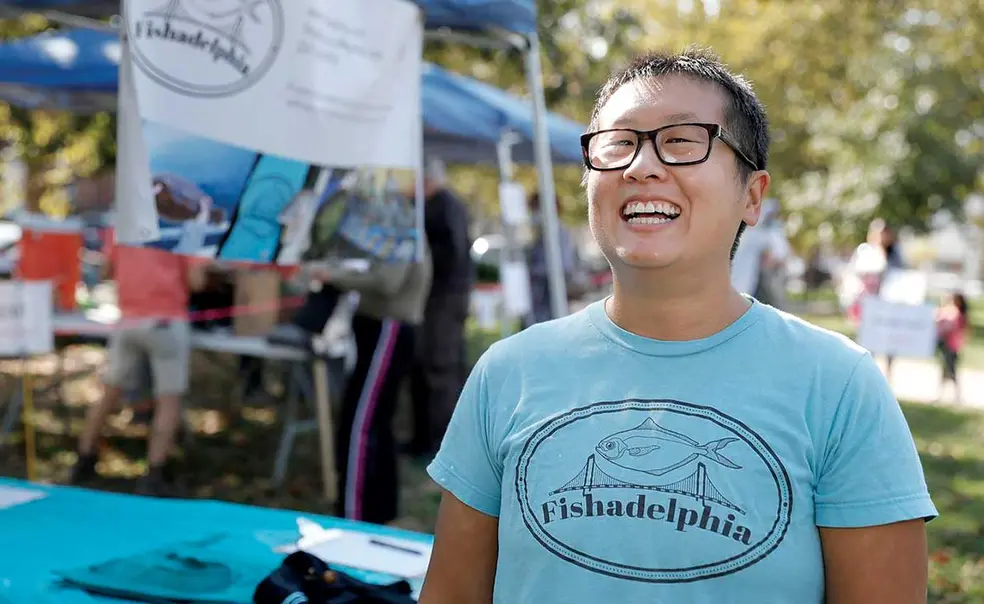Nonprofit Brings Seafood to Philadelphia’s Lower-Income Communities
A former Princeton postdoc, Talia Young founded Fishadelphia
The pandemic is bad for pretty much everyone, but people still need to eat. Talia Young is there to serve them.
A former Princeton postdoc in the lab of EEB professor Simon Levin, Young founded Fishadelphia two years ago as a community nonprofit that aims to bring affordable seafood to underserved communities in Philadelphia. She tries to connect lower-income people with seafood farms and fishermen along the Jersey shore.
Young, now a visiting assistant professor of environmental studies at Haverford College, was a high school biology teacher before earning her Ph.D., and students from two Philadelphia public high schools run many of Fishadelphia’s day-to-day operations, such as bookkeeping, preparing orders, and responding to emails. In non-COVID times, Young would also take them to the shore and teach them about fisheries and how to run a small business.
The project grew partly out of Young’s postdoctoral work, where from 2016 until last winter she studied coastal ecosystems and the resilience of fishing communities. Analyzing logbooks to track the movements of fishing vessels, Young and other researchers found that large vessels that primarily fished two species — summer flounder and Atlantic croaker — generally followed the fish as ocean temperatures increased, moving from waters off the coast of North Carolina 20-plus years ago to waters off New Jersey today. Smaller vessels often adapted by diversifying their catch, the researchers found. “In this time of rapid environmental change, environmental and socio-cultural displacement is likely to become a common feature in communities dependent on natural resources,” they wrote in 2019 in ICES Journal of Marine Science.
The inspiration for Fishadelphia, Young says, came at an academic conference in 2016 when a fisherman complained that Americans “only know how to eat cod and salmon fillets.” From her experience growing up as a Chinese American in New York, Young knew that people in her community ate everything from jellyfish to eels. Fishadelphia, she thought, could help both consumers and the fishing industry as it worked to adapt to new conditions.
Fishadelphia customers receive deliveries of fish and shellfish caught off the New Jersey shore every other week. Fishadelphia delivers whatever type of catch the fishing boats happen to bring in at that time of year, from flounder to sea bass to bluefish. It’s impossible to say ahead of time — as Young jokes, your order hasn’t been caught yet.
If nothing else, Young says, COVID-19 has been an exercise in resilience, for herself as well as the commercial fishing industry. “Boats are still fishing, people are still eating, and we’ve adapted dramatically to the challenging circumstances,” she notes, by developing new ways of buying, selling, and distributing — just as fishing vessels have adapted to climate change.












1 Response
Rocky Semmes ’79
5 Years AgoFeeding the World Without Fish and Meat
Former Princeton postdoc Talia Young merits credit and gratitude for Fishadelphia, her win-win creative nonprofit bridging COVID-compromised fishing businesses with underserved and lower-income communities in Philadelphia seeking affordable food options (“Catch of the Day,” January issue). If, however, we learn any lesson from the current global woe betide from Wuhan (the consequence perhaps of bushmeat markets), it is that killing for any purpose is fundamentally bad policy.
The world can feed itself without any need whatsoever for the killing fields of euphemistic “fishing,” or feedlots, including poultry pens. The proposition seems extremist, but is truthfully entirely moderate. I randomly began eating meatless well over two years ago, and my health as a function of this diet is likely the best it has ever been.
Provisions will have to be made, of course, for easing the many in those industries into other jobs (requiring multiple generations, perhaps). Avoiding any subsequent social disruption as a consequence will require planning. But the end result of such a policy will be a win-win, just like Ms. Young’s current enterprise. This win-win applies to provider and consumer, as much as to the consumer and the formerly consumed. And anyone who tells you otherwise is full of baloney, perhaps literally as much as figuratively.